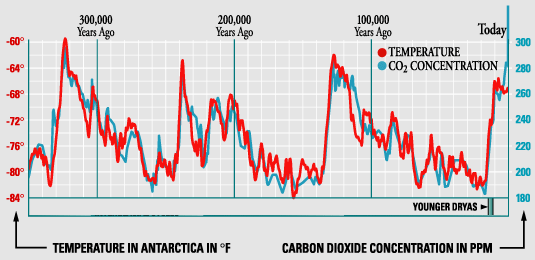The other day I found myself outside a newly-discovered library, and so naturally a few seconds later I was walking in. Aha! Book shelves! Walked up, pulled out the very first book on the shelf, and it was James Hanson's “Storms of My Grandchildren”. Hanson is, for those who came late, an adjunct professor in the Department of Earth and Environmental Sciences at Columbia University. He is one of the key promoters of catastrophic anthropomorphic global warming (CAGW), and his testimonies and activism have done much to promote the theory.
The reason I rejected CAGW in 2008 when I first looked at the global warming dispute was that I easily found evidence that contradicted the theory, but, having looked long and hard for solid science backing the CAGW claims, I never found any. So, with Hanson's book in my hand, I wondered if this might be a serendipitous moment; perhaps this book contained what I had been looking for? So I found a comfy chair.
Unfortunately, for a book written by a scientist, it was harder than I expected to find the science. It seemed to me mainly an account of how a plucky and socially conscious scientist (Hansen, of course) with an important message overcame indifference, hostility, and the opposition of the evil fossil fuel industry to finally triumph and alert the world to the evils of carbon dioxide (that's plant food to you and me and all other sane people). Chapters started, continued, and ended with the personal story of his struggle (mixed in with lots of photos of his grandchildren) and, once in a while, a bit of science.
In short, it took less time to read than I thought because all I looked for and read was the science. What I found didn't impress me, but it sure was written in an impressive style, and I could easily imagine non-scientists getting swept up by it. That's a problem, because our political rulers are non-scientists, almost to the last person.
Cause and Effect?
 My first issue with Hanson's presentation was centred on the embarrassing fact for the CAGW theory that ice core samples that show how temperature changes precedes carbon dixode changes by about 800 years - a fact that is close, in itself, to disproof of the theory. An effect cannot come before its cause. Amazon.com won't post me a book yesterday because I decide to purchase it today; how clear could a simple fact of life in this universe be? Every philosopher, every scientist, indeed, every sane person for 2,500 years has understood why. On page 38 Hanson talks about these ice cores. He honestly points out this embarrassing fact, but then makes this remarkable statement:
My first issue with Hanson's presentation was centred on the embarrassing fact for the CAGW theory that ice core samples that show how temperature changes precedes carbon dixode changes by about 800 years - a fact that is close, in itself, to disproof of the theory. An effect cannot come before its cause. Amazon.com won't post me a book yesterday because I decide to purchase it today; how clear could a simple fact of life in this universe be? Every philosopher, every scientist, indeed, every sane person for 2,500 years has understood why. On page 38 Hanson talks about these ice cores. He honestly points out this embarrassing fact, but then makes this remarkable statement:


 My first issue with Hanson's presentation was centred on the embarrassing fact for the CAGW theory that ice core samples that show how temperature changes precedes carbon dixode changes by about 800 years - a fact that is close, in itself, to disproof of the theory. An effect cannot come before its cause. Amazon.com won't post me a book yesterday because I decide to purchase it today; how clear could a simple fact of life in this universe be? Every philosopher, every scientist, indeed, every sane person for 2,500 years has understood why. On page 38 Hanson talks about these ice cores. He honestly points out this embarrassing fact, but then makes this remarkable statement:
My first issue with Hanson's presentation was centred on the embarrassing fact for the CAGW theory that ice core samples that show how temperature changes precedes carbon dixode changes by about 800 years - a fact that is close, in itself, to disproof of the theory. An effect cannot come before its cause. Amazon.com won't post me a book yesterday because I decide to purchase it today; how clear could a simple fact of life in this universe be? Every philosopher, every scientist, indeed, every sane person for 2,500 years has understood why. On page 38 Hanson talks about these ice cores. He honestly points out this embarrassing fact, but then makes this remarkable statement:
Recent comments
9 years 7 weeks ago
9 years 18 weeks ago
9 years 18 weeks ago
9 years 18 weeks ago
9 years 18 weeks ago
9 years 20 weeks ago
9 years 20 weeks ago
9 years 20 weeks ago
9 years 20 weeks ago
9 years 20 weeks ago